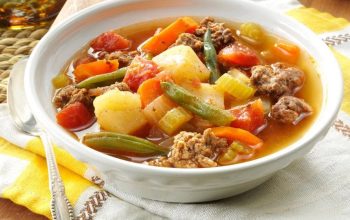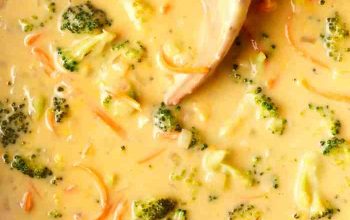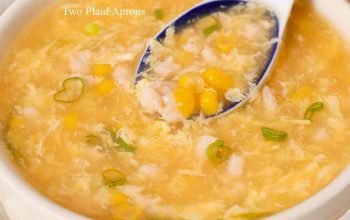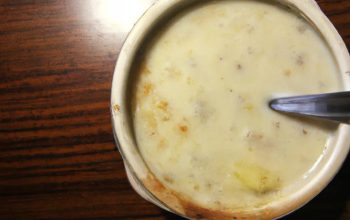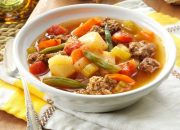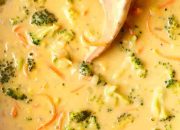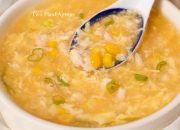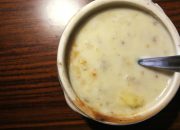Peanut Butter Soup: A Culinary Exploration
Peanut butter soup recipe – Peanut butter soup, a surprisingly versatile dish, transcends simple comfort food. Its creamy texture and adaptable flavor profile allow for endless culinary adventures, ranging from sweet and comforting to savory and spicy. This exploration delves into the diverse world of peanut butter soup, covering recipe variations, ingredient considerations, cooking techniques, serving suggestions, nutritional aspects, and troubleshooting tips.
Recipe Variations
Three distinct peanut butter soup recipes showcase the dish’s adaptability. Each variation offers a unique flavor profile, drawing inspiration from different culinary traditions.
| Ingredient | Quantity | Unit | Sweet Peanut Butter Soup | Savory Peanut Butter Soup | Spicy Peanut Butter Soup |
|---|---|---|---|---|---|
| Peanut Butter | 1 cup | Creamy | Creamy | Crunchy | |
| Broth | 4 cups | Chicken | Vegetable | Vegetable | |
| Sweetener | 1/2 cup | Brown Sugar | N/A | N/A | |
| Spices | To taste | Cinnamon, nutmeg | Garlic powder, onion powder | Cayenne pepper, ginger | |
| Other | As needed | Vanilla extract, banana | Soy sauce, sesame oil | Lime juice, cilantro |
The sweet version, reminiscent of a creamy dessert soup, draws inspiration from American comfort food traditions. The savory version reflects influences from Southeast Asian cuisine, incorporating the umami richness of soy sauce and sesame oil. The spicy variation takes cues from South American and Caribbean flavors, utilizing the heat of cayenne pepper and the freshness of lime.
The sweet peanut butter soup presents a smooth, golden hue, its consistency akin to a thick pudding. The savory soup displays a richer, deeper brown, its texture smoother than the sweet variant, yet still thick and luxurious. The spicy soup, flecked with visible crunchy peanut pieces, maintains a thicker consistency with a vibrant, reddish-brown color.
Ingredient Exploration, Peanut butter soup recipe
The choice of peanut butter, broth, and spices significantly impacts the final product. Understanding these ingredients’ roles is crucial for achieving the desired flavor and texture.
Creamy peanut butter creates a smoother, more velvety soup, while crunchy peanut butter adds textural contrast and a more pronounced peanut flavor. Vegetable broth provides a lighter, more neutral base, allowing other flavors to shine, whereas chicken broth adds a richer, savory depth. Spices like curry powder impart warm, earthy notes, while ginger adds a subtle pungency and cayenne pepper introduces a fiery kick.
Cooking Methods and Techniques
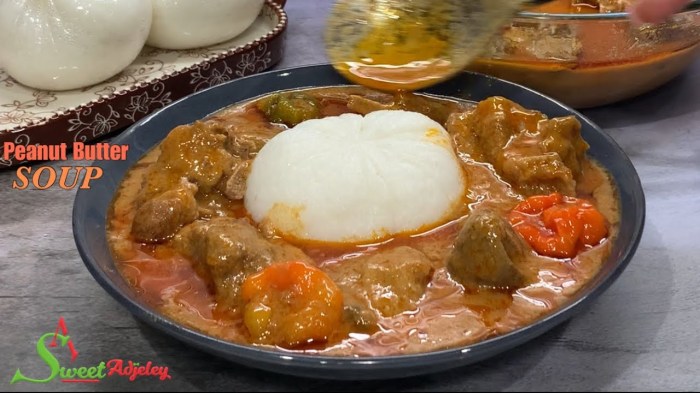
Source: tableandflavor.com
Three methods for preparing peanut butter soup offer varying levels of convenience and control over the cooking process.
The stovetop method offers quick preparation and precise temperature control. The slow cooker method requires minimal attention but may result in a less intensely flavored soup. The no-blend method, achieved through meticulous whisking and simmering, provides a uniquely rustic texture.
Slow Cooker Method:
- Combine peanut butter, broth, and desired spices in a slow cooker.
- Cook on low for 6-8 hours or high for 3-4 hours, stirring occasionally.
- Adjust seasonings to taste before serving.
Advantages include hands-off cooking and even heat distribution. Disadvantages include longer cooking times and potential for overcooking if not monitored.
Achieving a smooth texture without a blender involves whisking the peanut butter vigorously into a small amount of hot broth before gradually adding the remaining broth. Simmering gently over low heat for an extended period helps to further emulsify the mixture, resulting in a smooth, creamy consistency.
Serving Suggestions and Pairings
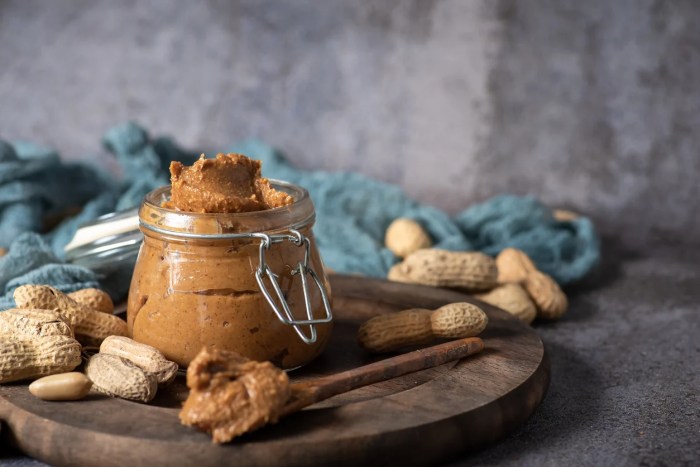
Source: drivinvibin.com
Peanut butter soup’s versatility extends to its serving suggestions and pairings. A variety of accompaniments can elevate this simple dish to a culinary experience.
- Garnish with chopped peanuts, a swirl of coconut milk, or a sprinkle of chili flakes.
- Serve with crusty bread for dipping.
- Pair with a side salad for a balanced meal.
- Top with toasted coconut flakes for added texture and flavor.
- Add a dollop of sour cream or Greek yogurt for a tangy contrast.
Peanut butter soup pairs well with various breads, crackers, and salads. The creamy texture complements the crispness of fresh vegetables, while the savory or sweet notes of the soup balance the richness of the accompaniments.
Nutritional Aspects
Peanut butter soup offers a surprisingly nutritious meal, providing a good source of protein, healthy fats, and essential vitamins and minerals.
Dietary modifications are easily implemented. Vegan options utilize vegetable broth and avoid any dairy-based garnishes. Gluten-free versions simply ensure that all ingredients are naturally gluten-free. Specific nutritional information will vary depending on the recipe and ingredients used.
| Nutrient | Sweet | Savory | Spicy |
|---|---|---|---|
| Calories (per serving) | Approx. 300 | Approx. 250 | Approx. 280 |
| Protein (per serving) | Approx. 10g | Approx. 12g | Approx. 15g |
| Fat (per serving) | Approx. 15g | Approx. 12g | Approx. 14g |
| Carbohydrates (per serving) | Approx. 35g | Approx. 30g | Approx. 32g |
Note: These are approximate values and may vary based on specific ingredients and portion sizes.
Troubleshooting and Tips
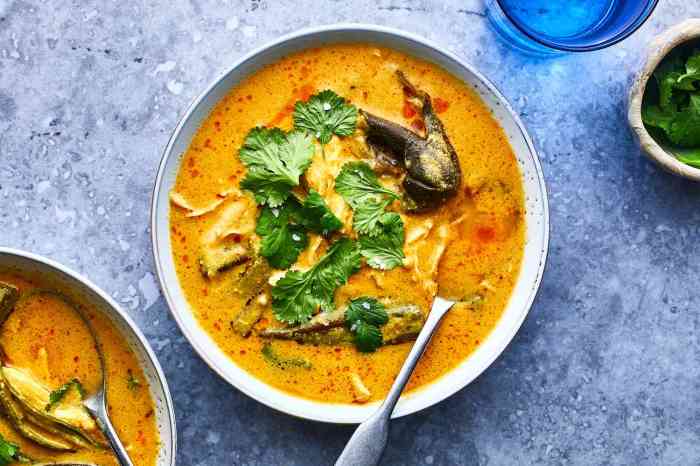
Source: thespruceeats.com
Common issues encountered when making peanut butter soup are easily addressed with simple solutions.
| Problem | Solution |
|---|---|
| Soup is too thick | Add more broth, a little at a time, until desired consistency is reached. |
| Soup is too thin | Simmer uncovered to reduce the liquid. Alternatively, thicken with a cornstarch slurry. |
| Soup is bland | Add more spices, salt, or a squeeze of lemon or lime juice to enhance the flavor. |
| Peanut butter is separating | Use a high-quality peanut butter, ensure thorough mixing, and simmer gently. |
For achieving the perfect consistency, use a high-quality peanut butter and whisk it thoroughly before adding it to the hot broth. Simmering gently for an extended period ensures that the flavors meld and the soup achieves a smooth, creamy texture. Adjusting seasonings throughout the cooking process is crucial for achieving optimal flavor.
FAQ Explained: Peanut Butter Soup Recipe
Can I use salted peanut butter?
Yes, but adjust the salt in the recipe accordingly. You may need less additional salt if using salted peanut butter.
How long can I store leftover peanut butter soup?
Store leftover soup in an airtight container in the refrigerator for up to 3-4 days.
Can I freeze peanut butter soup?
Yes, peanut butter soup freezes well. Allow it to cool completely before freezing in airtight containers for up to 2 months.
What if my soup is too thick?
Add a little more broth or water, one tablespoon at a time, until you reach your desired consistency.
What if my soup is too thin?
Peanut butter soup, while unusual, offers a surprisingly creamy and savory experience. For a contrasting, yet equally comforting, option, you might explore heartier choices like a vegetable soup recipe with cabbage , which provides a robust base of flavors. Returning to peanut butter soup, remember that the key is balancing the sweetness of the peanut butter with savory spices for a truly satisfying bowl.
Simmer the soup uncovered for a longer period to reduce the liquid. You can also add a cornstarch slurry (1 tablespoon cornstarch mixed with 2 tablespoons cold water) to thicken it.


